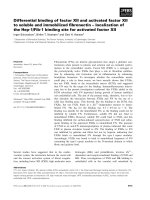Whatever Happened to Frank and Fearless- The Impact of the New Public Management on the Australian Public Service ppt
Bạn đang xem bản rút gọn của tài liệu. Xem và tải ngay bản đầy đủ của tài liệu tại đây (1.84 MB, 176 trang )
Whatever Happened to
Frank and Fearless?
The impact of new public management
on the Australian Public Service
Whatever Happened to
Frank and Fearless?
The impact of new public management
on the Australian Public Service
Kathy MacDermott
Published by ANU E Press
The Australian National University
Canberra ACT 0200, Australia
Email:
This title is also available online at: />National Library of Australia
Cataloguing-in-Publication entry
Author:
MacDermott, Kathy.
Title:
Whatever happened to frank and fearless? : the impact of
the new public service management on the Australian
public service / Kathy MacDermott.
ISBN:
9781921313912 (pbk.)
9781921313929 (web)
Series:
ANZSOG series
Notes:
Bibliography.
Subjects:
Civil service--Australia.
Public administration--Australia.
Australia--Politics and government.
Dewey Number: 351.94
All rights reserved. No part of this publication may be reproduced, stored in a
retrieval system or transmitted in any form or by any means, electronic, mechanical,
photocopying or otherwise, without the prior permission of the publisher.
Cover design by John Butcher.
Printed by University Printing Services, ANU
Funding for this monograph series has been provided by the Australia and New
Zealand School of Government Research Program.
This edition © 2008 ANU E Press
John Wanna, Series Editor
Professor John Wanna is the Sir John Bunting Chair of
Public Administration at the Research School of Social
Sciences at The Australian National University. He is
the director of research for the Australian and New
Zealand School of Government (ANZSOG). He is also
a joint appointment with the Department of Politics
and Public Policy at Griffith University and a principal
researcher with two research centres: the Governance
and Public Policy Research Centre and the nationallyfunded Key Centre in Ethics, Law, Justice and
Governance at Griffith University. Professor Wanna has produced around 17
books including two national text books on policy and public management. He
has produced a number of research-based studies on budgeting and financial
management including: Budgetary Management and Control (1990); Managing
Public Expenditure (2000), From Accounting to Accountability (2001) and, most
recently, Controlling Public Expenditure (2003). He has just completed a study
of state level leadership covering all the state and territory leaders — entitled
Yes Premier: Labor leadership in Australia’s states and territories — and has
edited a book on Westminster Legacies in Asia and the Pacific — Westminster
Legacies: Democracy and responsible government in Asia and the Pacific. He
was a chief investigator in a major Australian Research Council funded study
of the Future of Governance in Australia (1999-2001) involving Griffith and
the ANU. His research interests include Australian and comparative politics,
public expenditure and budgeting, and government-business relations. He
also writes on Australian politics in newspapers such as The Australian,
Courier-Mail and The Canberra Times and has been a regular state political
commentator on ABC radio and TV.
Table of Contents
Author Profile
ix
Acknowledgements
xi
Foreword
xiii
Overview
xv
Chapter 1. A failure of public administration?
1
Chapter 2. The regime of contestability
25
Chapter 3. Individual performance management and assessment and
‘assumption cultures’
43
Chapter 4. Devolution
69
Chapter 5. Aligning the service: the impact of workplace relations
89
Chapter 6. To market, to market: outsourcing the public service
109
Chapter 7. Reforming the reforms?
129
References
137
Appendix: Extract from Chronology no. 1 2002-03 — Changes in the
Australian Public Service 1975-2003
151
vii
Author Profile
Dr Kathy MacDermott has taught in universities in Australia and the United
States. More recently, she has worked in the senior executive service of the
Australian Public Service in industrial relations policy and public sector
governance, and has published in these areas. Her responsibilities have included
managing evaluations of how the APS Values and Code of Conduct have been
applied in practice and the conduct of the annual State of the Service report.
ix
Acknowledgements
I would like to thank Andrew Podger for reading and rereading the manuscript
and providing valuable and patient commentary, John Nethercote for his
thorough comments and suggestions, and David Webster for his persistent
contribution to quality control. Thanks too to the two anonymous reviewers
whose comments and suggestions have contributed to shaping the final product.
I would also like to thank the State of the Service team for the important research
that they have made publicly available. More generally, I would also like to
acknowledge the influence of many public servants with whom I have worked,
who continue to struggle with these issues every day and who care about
personal and public integrity. Discussions with these people lie behind the
hypothetical cases raised in the book. Discussions with Amy Webster and Sarah
Webster lie behind the desire to write it in the first place. I am also grateful to
ANZSOG and, especially, to John Wanna and John Butcher for their advice
throughout the process and to Anne Gelling for her editorial assistance.
xi
Foreword
Dr Kathy MacDermott’s monograph sets out a series of controversial arguments
that challenge some widely and strongly held views.
Many, like me, continue to regard the New Public Management reforms of the
1980s and 1990s in Australia as groundbreaking, demonstrating how the public
sector can deliver efficient and effective services in an internationally competitive
economy. Many also of my vintage and older continue to view favourably the
Coombs Royal Commission’s other two emphases on responsiveness to the elected
government and community participation in government, reinforcing democratic
principles and breaking down the hegemony of the public service. And there
are strong adherents of the more recent emphasis on performance management
and workplace reform.
MacDermott does not oppose these reforms, but questions how some have been
applied in practice and how they have cumulatively re-positioned public servants
and their relationship with the political arm of government. In doing so, some
leaders of the reforms will no doubt feel somewhat uncomfortable about aspects
of MacDermott’s analysis.
This monograph is important. It does not suggest turning back the clock, but
seeks reconsideration of some of the effects of the reforms of the last 25 years.
Have some gone too far? Have we lost sight of the idealistic aspirations behind
some of the reforms? Have there been unintended consequences from some
initiatives? Have we let the rhetoric run away from the reality?
Importantly, MacDermott looks at the reforms from the perspective of public
servants down the line, not just departmental secretaries. What is the context
in which they now operate and what behaviours do they believe the system
expects of them today? In particular, are they encouraged to be responsive to
the point where they compromise their duty to be apolitical and impartial and
concerned for the public interest?
Some of the challenges MacDermott identifies are:
•
•
•
the extent to which contestability of policy advice is improving the contest
for ideas or enhancing the ability of governments to find the advice they
want;
the extent to which performance management is improving organisational
performance or reinforcing pressure to conform;
the extent to which devolution has enhanced flexibility to deliver better
results or has involved a trade-off of policy influence for managerial control,
with public servants subject to closer direction by both managers and by
ministerial advisers and ministers;
xiii
Whatever Happened to Frank and Fearless?
•
•
the extent to which workforce reforms in the public sector have increased
flexibility and enhanced employees’ capacity to identify with and contribute
to organisational objectives, or have disempowered employees, discouraged
teamwork and reduced innovation and professional autonomy;
the extent to which outsourcing has improved efficiency and effectiveness
through competition or has undermined altruism and concern for the public
interest both within the public service and amongst the non-government
sector.
I do not agree with all of MacDermott’s conclusions, although I know of real
instances that are consistent with almost all of her hypothetical cases and I know
well that the APS Commission survey data confirm widespread unease amongst
public servants. In a few cases, however, I think that unease is just misplaced;
in other cases, there is indeed supporting evidence reinforcing the need to revisit
current practice, for example in performance management and workplace
relations.
More generally, MacDermott’s plea for a firmer focus on public value strikes a
chord with me. Public servants do want to serve the elected government, but
they want to be recognised by government and the public for their contribution
to the public interest by their professionalism. The opportunity to serve the
public remains the greatest attraction to join the public service, and the greatest
motivator to perform. If not managed appropriately some of the reforms,
notwithstanding their intrinsic merits, do present a danger of undermining this
fundamental value which drives the public service.
Andrew Podger
xiv
Overview
Under s.10(1)(a) of the Public Service Act 1999 (hereafter referred to as the Public
Service Act) the Australian public service (the APS) is required to be ‘apolitical,
performing its functions in an impartial and professional manner’. Under s.10(1)(f)
it is required to be ‘responsive’ in advising government and in implementing
its policies and programs.
In recent times—but not, certainly, for the first time in recent Australian
history—doubts have arisen about the ability of public servants to maintain the
balance between these functions. Much has been written about a perceived
politicisation of the public service. Two separate, but interrelated, sets of
circumstance have fed these debates. The first of these is a cluster of events at
the political level, in which the role of Australian public servants has been
criticised or questioned. The second is the introduction into the public service
of new models of organisation, administration and behaviour, known collectively
here as New Public Management or NPM.
Though the implementation of NPM has been tailored by different governments
to their differing requirements, its underpinning principles have been broadly
supported by Australian political parties since its emergence in the 1980s. The
overall aim of NPM is to make the public service more flexible and efficient,
and more responsive to government. Key components of NPM at the
Commonwealth level in Australia have included making the work of public
servants contestable; the introduction of performance management, including
individual performance assessment and pay; the devolution of centralised
managerial controls to individual agencies; the restructuring of public sector
industrial relations according to contract-based models; and the outsourcing of
service delivery to third-party service providers (including profit-based and
not-for-profit entities). Most people working within and writing about the public
service during the implementation of NPM reforms have accepted that these
disciplines have improved its flexibility and efficiency. However, the disciplines
associated with NPM have also provided the means to reshape relations between
government and the public service in less benign ways.
The aim of this monograph is to analyse a number of key NPM systems with
regard to their involvement—individually and in aggregate—in such changes
to the relations between government and the public service. It is thus about the
expression of public service governance and frameworks in the Australian body
politic rather than about how the public service has operated in specific recent
events. It is focused on the public service at the Commonwealth level, although
this does not mean that a similar analysis of state public sectors could not be
undertaken.
xv
Whatever Happened to Frank and Fearless?
The overall conclusion is that the NPM reforms have been internalised by the
public service in ways that leave it much less protected against pressures towards
politicisation than in the past. This is not to deny its increased efficiency1 nor
does it mean that it is necessary to turn back the clock and undo what has been
done in the interests of public sector reform. There are, however, ways of
recalibrating the drivers of the system so that public servants are better able to
distinguish their role from that of ministerial advisers. Some of these issues and
options are considered in chapter seven.
ENDNOTES
1 See, for example, Public Service and Merit Protection Commission, Re-engineering People Management:
From Good Intentions to Good Practice (Canberra, 1997), Ch. 1; />publications96/reengineering.htm, viewed 14 Feb. 2008; Australian National Audit Office Audit Report,
Managing People for Business Outcomes: Year Two, Across Agency, ANAO Audit Report No.50 2002-2003
(Canberra, 2003), part of a longitudinal study of the effectiveness and efficiency of all aspects of people
management in 13 agencies, covering some 36% of APS employees. The study assessed each
people-management practice area against four criteria: quality, HR integration, effectiveness and
efficiency, and business contribution.
xvi
Chapter 1. A failure of public
administration?
Introduction
Debate in the press about the politicisation of the APS has intensified in recent
years. Undoubtedly these debates are not new. As will be seen, debate about
the ‘proper’ role of the public service has continued virtually unabated since
the Whitlam Government introduced ministerial advisers following its election
in 1972. Nevertheless, commentators on both sides of politics have reflected on
both the number and profile of recent controversies involving perceptions of
public service politicisation.1 These include the ‘Children Overboard’ affair
(known to the Senate as ‘A Certain Maritime Incident’) involving the Departments
of Defence, Immigration and the Prime Minister and Cabinet; the cases of the
detention of Cornelia Rau and the deportation of Vivian Solon, involving the
then Department of Immigration and Multicultural and Indigenous Affairs
(DIMIA);2 the payments made by the Australian Wheat Board (AWB) to the
regime of Saddam Hussein in order to obtain contracts for the sale of Australian
wheat to Iraq, involving the Department of Foreign Affairs and Trade (DFAT);
the detention of Dr Mohamed Haneef, involving the Australian Federal Police;
and the role of a senior public servant in the Employment and Workplace
Relations portfolio as the face of the Howard Government’s WorkChoices media
campaign.
Debate around most of these cases has tended, particularly in media analysis, to
focus on issues of ‘who knew what and when’. All except the last have resulted
in some form of formal inquiry.3 Each involves allegations or suppositions about
the degree of direct or indirect complicity between public servants and politicians
concerning the communication or management of politically sensitive information.
It is not the intent of this monograph to pursue what is known or can be inferred
about the involvement of individual public servants in these cases. Rather, it
explores how changes made to the administration of the public service over the
past 30 years have had the effect of progressively blurring the differences
between what professional public servants do and what politicians might want
them to do.
The chapters that follow argue that a number of the core ‘traditional’ principles
of public administration that have applied in Australian, as in other Westminster
systems of government,4 have been compromised following New Public
Management reforms. Australian NPM, it will be argued, brought about a number
of distinct and mutually reinforcing institutional reforms embedded in a number
of distinct and mutually reinforcing systems. Like all system changes, they were
1
Whatever Happened to Frank and Fearless?
introduced gradually, applied unevenly, and have been the work of many hands.
The formal intention was to introduce new disciplines to the public service,
making it more efficient, effective and responsive to government. Over time,
however, some of those disciplines have been ratcheted up to the point where
responsiveness tips into complicity.
The following description and analysis of how this happened, and is continuing
to happen, is intended to inform broader debates about the role and function of
the public service in the early twenty-first century. The examples cited are
recent and in the public domain, but it should be understood, as a former Public
Service Commissioner has observed, that ‘insiders know better than anyone …
that the concerns have been mounting in the Commonwealth since before 1996,
and have been evident equally if not more so at state level under both Labor
and conservative governments’.5
The terms of the debate
In 2006 the then Secretary of the Department of the Prime Minister and Cabinet,
Dr Peter Shergold, described the ‘Children Overboard’ affair and the mistreatment
of Cornelia Rau and Vivian Solon as ‘failures of public administration’,
unfortunate ‘mistakes’ that have nothing to tell us about public service culture
or the relation between the public service and the Government:
I do not accept that the failures represent the collapse of the Westminster
tradition or the diminution of public service values or a sad decline in
ethical standards. More profoundly, the mistakes are failures of public
administration not instances of government conspiracy. The government
did not direct public servants to provide false information or fail to
correct the record or act outside the law. Nor did it intimate that such
behaviour was acceptable. Nor did Ministers put impenetrable barriers
around themselves.6
This representation of the present state of the public service is significant for a
number of reasons. The language suggests that, so long as the Government did
not explicitly direct, or intimate, that public servants should act unethically or
unlawfully, then there were no broader institutional issues and the problems
were simply local. That is not, however, how the system works or is meant to
work. Public servants are meant to serve ministers and act in their name. The
Public Service Act calls for responsiveness to ministers (s.10(1)(f)), responsiveness
that anticipates as well as implements their requirements. It calls for a
performance culture with a focus on ‘achieving results’ sought by government
(s. 10(1)(k)). Responsiveness is hardwired into service-wide legislation,
service-wide policies, and agency arrangements to support them. Without an
understanding of how this overarching framework positions individual public
2
A failure of public administration?
servants who are making (or failing to make) administrative decisions, there is
always going to be an increased risk of ‘failures of public administration’:
We look to previous instances, such as the ‘certain maritime incident’
or children overboard affair; the illegal detention of Australian citizens
by the Department of Immigration and Indigenous Affairs, the problems
revealed by the so-called ‘travel rorts’ affair, and difficulties with trust
fund monies in the land transport development fund. Any one of these
in isolation would be a problem that could be attributed to one-off failings
on the part of individuals. Taken together, they begin to amount to a
pattern—a systematic lack of capacity to identify problems, keep accurate
records, and draw these uncomfortable problems to the attention of
ministers.7
The real questions to ask about these failures are:
•
•
•
can a system that privileges responsiveness be tipped into complicity?
what are the circumstances that turn individual lapses of judgement into
systems failures?
can the cause of these failings properly be labelled as politicisation?
Critically, these questions are often about the changing meanings of the terms
in which the questions themselves are posed. Over time and across contexts the
meanings of even key words like ‘politicisation’ and ‘responsiveness’ alter, as
do those of more obviously slippery terms like ‘performance culture’,
‘contestability’, ‘managing for results’, ‘organisational alignment’,
‘partnerships’—and even ‘New Public Management’ itself, which is subject to
ongoing debate and redefinition.8 All of these terms are embedded in and
changed by the history of their use.
Take ‘responsiveness’, for example. The need for increased responsiveness was
identified by the Royal Commission on Australian Government Administration
(RCAGA) in 1976. As will be seen later in the chapter, RCAGA used the term to
refer to a more adaptive approach to service delivery as well as a sensitivity to
government objectives that included a more efficient approach to implementing
them. Over time, the latter became the dominant meaning of ‘responsiveness’
for the APS. Looking back in 1993 on the broad pattern of the Dawkins reforms
in the 1980s, Prime Minister Paul Keating reflected that:
Central to our reforms of the public service was the desire to ensure that
the government of the country belonged to the elected politicians. We
stated at the outset that a key objective was to make the Public Service
more responsive to the government of the day, more responsive in the
sense that it would be better able to recognise and achieve the
Government’s overall policy objectives.9
3
Whatever Happened to Frank and Fearless?
In 1999 ‘responsiveness’ acquired a legal definition as one of the APS Values
established in the Public Service Act to guide the conduct of public servants.
The initial Public Service Bill 1997, presented by Peter Reith, included the bare
clause (s.10(f)): ‘the APS is responsive to the Government in providing timely
advice and implementing the Government’s policies and programs’. This emphasis
on both advising and implementation was broadly consistent with the overall
thrust of RCAGA, but the definition itself lacked a number of critical qualifiers
that had been recommended to the Government. The Bill was referred to the
Joint Committee on Public Accounts (JCPA), which urged a strengthening ‘in
relation to the provision of frank and honest advice’.10 Fearlessness, it appears,
was not even on the agenda. Senate amendments unacceptable to the Government
were made and the Bill was allowed by Minister Reith to lapse. The next Minister
Assisting the Prime Minister for the Public Service shepherded an amended
version through Parliament which read: ‘the APS is responsive to the Government
in providing frank, honest, comprehensive, accurate and timely advice and in
implementing the Government’s policies and programs’ (s. 10(1)(f)).
Section 10(1)(f) of the Public Service Act has since been elaborated by the Public
Service Commissioner in APS Values and Code of Conduct in Practice: A Guide to
Official Conduct for APS Employees and Agency Heads. The guidance still links
operational efficiency with strategic attainment of government goals, and
emphasises ‘a close and cooperative relationship with Ministers and their
employees’:
Responsiveness to the Government demands a willingness and capacity
to be effective and efficient. Responsive APS employees:
•
•
•
•
•
•
•
•
are knowledgeable about the Government's stated policies
are sensitive to the intent and direction of policy
take a whole-of-government view [and] are well informed about the
issues involved
draw on professional knowledge and expertise and are alert to best
practice
consult relevant stakeholders and understand their different
perspectives
provide practical and realistic options and assess their costs, benefits
and consequences
convey advice clearly and succinctly
carry out decisions and implement programs promptly,
conscientiously, efficiently and effectively.
Responsive advice is frank, honest, comprehensive, accurate and timely
(APS Value (f)). The advice should be well argued and creative, anticipate
issues and appreciate the underlying intent of government policy.
4
A failure of public administration?
Responsive advice is also forthright and direct and does not withhold
or gloss over important known facts or 'bad news'.
Responsiveness demands a close and cooperative relationship with
Ministers and their employees. The policy advisory process is an iterative
one, which may involve frequent feedback between the APS and the
Minister and his or her office.
Responsive implementation of the Government's policies and programs
(APS Value (f)) is achieved through a close and cooperative relationship
with Ministers and their employees. Ministers may make decisions, and
issue policy guidelines with which decisions made by APS employees
must comply. Such Ministerial decisions and policy guidance must, of
course, comply with the law and decisions by APS employees must meet
their responsibilities for impartiality and efficient, effective and ethical
use of resources.11
Adjusted or alternative definitions of what ‘responsiveness’ should mean have
been posed by academics, media commentators, and members of the Opposition.12
What it means in practice to working public servants, when disciplined by the
contestability of policy advice (see Chapter 2), inserted in a performance
management system (see Chapter 3), experienced through devolved relations
with specific ministers’ offices (see Chapter 4), aligned with ministerial priorities
through individual contracts (see Chapter 5) and re-expressed through a
cooperative partnership (see Chapter 6), can shrink to ‘what have you done for
the minister that’s special’?13 This is not the normative meaning of
‘responsiveness’, but it can be the operational one.
Or take ‘politicisation’. A recent article by Richard Mulgan offers a useful and
much-needed account of the concept as ‘understood within the context of the
APS Values associated with a professional public service’:
In order to be able to offer the same degree of loyal service to
governments of differing political persuasions, professional public
servants are expected to maintain a certain distance from concerns of
their political masters. ‘Politicisation’ is the term used to describe the
erosion of such distance. It marks the crossing of a line between proper
responsiveness to the elected government and undue involvement in the
government’s electoral fortunes.14
For the public service, the legislated equivalent of this is the requirement under
section 10 of the Public Service Act to be ‘apolitical, performing its functions
in an impartial and professional manner’. As in the case of ‘responsiveness’, this
definition has been elaborated by the Public Service Commissioner:
5
Whatever Happened to Frank and Fearless?
The role of the APS is to serve the Government of the day: to provide
the same high standard of policy advice, implementation and professional
support, irrespective of which political party is in power. This is at the
core of the professionalism of the APS.
The APS works within, and to implement, the elected government’s
policies and outcomes. While it is not independent, it is well placed to
draw on a depth of knowledge and experience including longer-term
perspectives.
Good advice from the APS is unbiased and objective. It is politically
neutral but not naïve, and is developed and offered with an
understanding of its implications and of the broader policy directions
set by government.
APS employees have a role to assist Ministers with their parliamentary
and public roles, such as drafting speeches.
In the course of their employment, however, APS employees should not
engage in party political activities such as distributing political material,
nor should they use office facilities or resources to provide support of a
party political nature such as producing political publications or
conducting market research unrelated to programme responsibilities.15
These definitions are altogether consistent with that proposed by Mulgan. Like
his, however, they remain ‘slippery in meaning because the line [between proper
responsiveness to the elected government and undue involvement] itself is often
blurred and hard to draw and because charges of politicisation are often part of
adversarial political rhetoric’.16 One of the most common defences against a
charge of politicisation, for example, is to treat the word as an indicator of the
personal or party agenda of whoever used it.17 Another means of neutering the
concept—described by Mulgan as ‘singl[ing] out the more overt form of direct
instruction’—is to reduce it to whether or not a government ‘issued … direct
instructions to falsify the record’.18 Consistent with this strategy, analysts who
hypothesise the existence of less overt forms of politicisation lay themselves
open to being criticised as conspiracy theorists. In any event, to confine an
analysis of politicisation to ‘who said what to whom, when’ simply shifts
attention away from institutions to individuals. While there is much to be said
at this level, it is often associated with histories of specific events or interactions,
generally between individual public servants and their ministers and ministerial
advisers. These histories assume that, whether or not specific interactions were
proper, there is a normative version of such relationships, one in which the
proper line between responsiveness to the elected government and undue
involvement is respected. Such an assumption incorporates a further assumption
6
A failure of public administration?
that both public servants and ministers and their advisers clearly understand
their different roles. This has not always been the case.
Ministerial advisers were added to the machinery of government by Labor
following the 1972 election. RCAGA itself ’did not generally favour policy
advisers in ministers offices’.19 It recommended instead that where a minister
felt the need for additional policy advice, ’it will frequently be more helpful to
him if the resources of the department are more effectively mobilised or
stimulated to be responsive to his needs‘.20 Nevertheless, the Fraser Government
did not abolish the institution, although it did cut back on its numbers. The
Hawke Government in its turn decided to greatly increase the number of
ministerial advisers, which it presented as a trade-off for not proceeding with
an election commitment to politicise 10 per cent of the senior executive service.21
This trade-off effectively clarified a difference in role between public servants
and ministerial advisers. Ministerial advisers would protect public servants from
pressure to become politicised by providing those services themselves, from
within the minister’s own private office. Thus, ‘the partisan policy role that had
been so controversial and fiercely resisted in the Whitlam period was asserted
and legitimised from the outset of the Hawke Labor period’.22 Over time, the
policy capacity of the ministerial office was strengthened23 and the work of the
senior public servant became more managerial.24 These changes have continued
to test the roles proper to public servants and ministerial advisers, secretaries
and ministers, and with them the definitions proper to ‘responsiveness’ and
‘politicisation’.
State of the Service and other data
When asked about their own understanding of their roles, departmental
secretaries reported themselves to be mainly ‘relaxed and comfortable’ about
their relations with ministers:
The confidential surveys of Secretaries conducted in recent years by
Professor Patrick Weller provide little evidence that ‘Australia’s
mandarins’ are intimidated. Every departmental secretary ‘declared that
the new contract conditions made no difference to the fearlessness of
their policy advice’ [although, a footnote advises, ‘several noted that
some of their colleagues were more cowed’]. Similarly a confidential
questionnaire undertaken by Professor Bob Gregory of 22 Secretaries
and Commonwealth government CEOs in late 2003 found that just three
agreed with the statement that politicians were improperly involving
themselves in the business of public servants. Gregory concluded that
‘in the minds of current APS departmental heads the conventions of
“traditional ministerial responsibility” are very much alive and well …’25
7
Whatever Happened to Frank and Fearless?
Just how much reliance can be placed on this kind of confidential research is
open to question. As far as those further down the line are concerned, a survey
conducted in the same year found that, of those public servants who had had
contact with ministers and their advisers over the previous two years, 35 per
cent had encountered a ‘challenge in balancing the need to be apolitical, impartial
and professional, responsive to the Government and openly accountable (as per
the APS Values) in dealing with ministers and/or ministers’ offices’, and a further
five per cent were unsure.26 The findings of subsequent surveys have remained
remarkably consistent with these perceptions.27 The questions put to secretaries
and to public servants were differently worded: those put to secretaries concerned
the behaviour of politicians generally, and those put to public servants were
confined to their own ministers and their advisers. More importantly, the
question of possible impropriety is differently put in each survey. The point is,
however, that if you are interested in whether systems unduly restrain the
provision of frank and fearless advice, you do not look only at those who are at
the top of the system. Bureaucratic decision making occurs all the way up (and
down) the line.
There are factors other than management systems that constrain decision making,
and some of these have a disproportionate impact on lower-level staff. With
respect to the challenges to public servants posed by ministers and their advisers,
it is undoubtedly the case that the considerable growth in the number of
ministerial advisers has increased the penetration of contact between ministers’
offices and agencies. According to the 2003–04 State of the Service Report, at 1
May 2004 the total number of ministerial personal staff was 392, an increase of
89 per cent from the 207 at April 1983,28 following the Hawke Government’s
decision to appoint political advisers to ministers’ offices. There are some simple
logistical reasons for this increase, including ministers’ needs for additional
support following changes in information and communications technology used
by media commentators, and the sheer physical size of the office space available
following the move to the new Parliament House. The simple fact that numbers
of ministerial staff have increased means, however, that there is more scope for
interaction between this group and public servants. Technological change—email,
mobile phones, SMS, etc.—means that there is increased scope for this contact
to be direct, bypassing conventional channels of approach down through the
hierarchy, and that the expectation is for short turn-around times.
While the increase in the numbers of ministerial advisers is known, there are
no pre-2003 data available on the corresponding increase in the numbers of
public servants who are responding to their requests. However, there are relevant
data on the classification levels of those public servants being contacted by
ministers and their advisers, and the extent to which public servants at different
levels have ‘experience[d] a challenge’ during one or more of those interactions.
In 2004–05, 73 per cent of Senior Executive Service employees surveyed reported
8
A failure of public administration?
having had direct contact29 with ministers and/or their advisers in the preceding
year. 35 per cent of their immediate subordinates (executive level employees)
and 15 per cent of the lower grades (APS 1–6) also reported having had direct
contact with the minister’s office. Given the actual numbers of employees in
each of these groups (the APS generally exhibits a pyramidal structure), it appears
that individuals in the lower grades who experienced this direct contact
outnumbered senior executive staff by a ratio of about 10:1.30 This is contrary
to the conventional view of how the system works.
Not surprisingly, executive-level public servants were less likely than
departmental secretaries to report being comfortable and confident during such
interactions. In 2004–5 one-third of public servants who had been in direct
contact with ministers or their advisers in the last 12 months reported that they
had only moderate (22 per cent) or very low (10 per cent) levels of confidence
that they could appropriately balance the legislated public service values of
being apolitical, impartial and professional, responsive to government and openly
accountable.31 This group is more likely to be on the receiving end of difficult
questions than APS-level staff, and less likely to be familiar with the conventions
for managing them than the senior executive staff. While confidence in balancing
the APS Values was found not to be correlated with age, sex or size of agency,
it was correlated with awareness of agreed written and unwritten processes in
place in an agency for resolving staff concerns about the nature of requests from
ministerial offices.32 This may go some way to further explaining why public
servants as a group are less confident than their departmental secretaries in their
interactions with ministers and their advisers: they are less likely to be familiar
with any conventions or protocols that apply to such interactions—and have
less power to assert any such knowledge.
There are some data on the availability of such protocols. For example, many
agencies require the purport of oral briefings to ministers or ministerial staff on
key issues to be confirmed in writing (including emails or follow-up minutes).
Nine large agencies reported in the 2004–05 State of the Service agency survey
that they had this protocol in place—a fact unlikely to have escaped their agency
heads—and yet between 37 and 66 per cent of their relevant employees were
not sure whether their agency had such a protocol in place.33 These people may
not have known whether they should be keeping records of their oral advice
any more than new or untrained ministerial advisers may have known whether
they could ask that records not be kept. It is in situations like this that decisions
can ‘make themselves’, and that the default response may become responsiveness,
where responsiveness has lost touch with any countervailing requirement for
apolitical professionalism. Advisers may ask that records not be kept and public
servants may see it as their duty to acquiesce. Or, even if public servants are
aware that they may be being asked to do something outside usual practice, they
9









